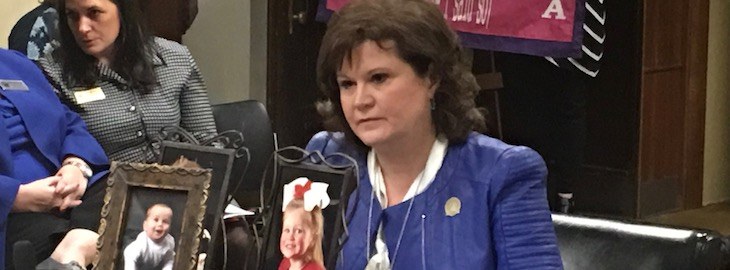Three grandparents’ rights bills pass Arkansas House committee
by March 9, 2017 8:41 am 13,263 views

Rep. Laurie Rushing, R-Hot Springs
Three grandparents’ rights bills passed a House committee Wednesday after the bills’ sponsor shared her personal story regarding the subject. She later said the bills would be combined into one.
House Bills 1568, 1654 and 1773 by Rep. Laurie Rushing, R-Hot Springs, would provide grandparents and great-grandparents additional legal redress when denied access to their grandchildren and great-grandchildren by the parents. The bills were passed by the House Committee on Aging, Children and Youth, Legislative and Military Affairs.
In cases where one or both parents are dead, missing or in a permanent vegetative state, grandparents and great-grandparents could petition a court for reasonable visitation rights of one to four weeks annually with the child. They would be required to prove that access would be in the child’s best interest.
Grandparents and great-grandparents also would have additional opportunities for redress in other situations – divorce, legal separation, where the child’s parents are not married, and where the parents are married but have created “unreasonable alienation” between the grandparents and the child. In those cases, grandparents would be required to petition the court for visitations, and the parents would have to prove the grandparents are unfit to see the child.
The legislation would clarify that grandparents would be given preferential consideration for placement of juveniles in foster care or adoption. Grandparents would go through the same process as other individuals in qualifying to be a foster or adoptive home. Current law already says relatives are given preferential treatment. Rushing said the legislation strengthens the language.
While all three bills were approved, Rushing later said they would be combined into one bill, House Bill 1773. An amendment will be placed in the Senate version that would allow grandparents to retain visitation if their child who is a parent dies and a new spouse adopts the children.
The bills passed on a voice vote, but legislators did have questions. Rep. Rep. LeAnne Burch, D-Monticello, an attorney, worried that the burden of proof for grandparents and great-grandparents would be too low and said part of the language in the bill already exists in current law. Rep. Frances Cavenaugh, R-Walnut Ridge, expressed concern about “mean grandparents.”
Rushing began her presentation by placing in front of herself photos of her grandchildren ages 6, 4 and 2, whom she has not seen in nearly a year. Last May 17, she received a phone call from her son-in-law informing her that her daughter had been found dead on the couch at their home in North Carolina.
She said May 28, when her son-in-law left Arkansas with her grandchildren, was “the last day I was able to see my grandbabies.” Rushing said her son-in-law, with whom she believed she had a good relationship, met another woman the Monday after he left Arkansas and quickly became engaged. On July 17, he informed Rushing and her husband through an email that they were no longer welcome at his house.
Rushing said Arkansas has good laws pertaining to grandparents’ rights while North Carolina does not. She said she began working on the legislation as a result of her own situation, but that passage would not affect her own case because her legal issues exist in North Carolina.
